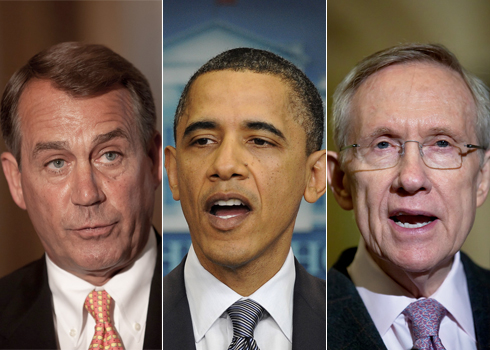The killing of Osama bin Laden put domestic politics on the back burner for members of Congress, who returned to Washington on Monday after a two week recess. But only briefly. Already Republicans are eager to change the topic, and both parties are returning to the enormous business at hand.
Democrats arrived on Capitol Hill Monday having walked deep into enemy territory. A series of missteps, driven by divisions within their party, have helped Republicans move the center of the legislative debate on Capitol Hill far to the right. Now Dems are trying to hold the line as the GOP advances on a decades-long goal of eroding the social safety net.
Over the past several months, Democrats have ratified two key GOP positions: first that reducing the deficit should be the government’s top priority; and second, that the best — if not the only — way to do this is by slashing spending. That’s a formula for eviscerating necessary programs, particularly the big entitlements like Social Security, Medicare, and Medicaid.
Democrats are belatedly waking up to this. They spent the recess attacking Republicans for voting to phase out Medicare, and trying to box them into ending tax loopholes that serve as corporate welfare for oil companies. But these peripheral political fights are actually stage-setters for the main event.
In about two weeks, the United States will hit its debt limit. If by early August, Congress hasn’t passed legislation allowing the Treasury to issue more debt, the country will default on its obligations. The entire Republican party — and now even some Democrats — have said they won’t do anything unless a bill to lift the debt ceiling does something both immediate and structural about the debt.
“The vehicle upon which something is likely to be achieved to reduce government spending is the debt ceiling,” Senate Minority Leader Mitch McConnell (R-KY) told reporters at his weekly Capitol briefing Tuesday. “I don’t intend to vote to raise the debt ceiling unless we do something significant about the debt.”
This runs deeply counter to the Obama administration’s stated view that the debt limit should be lifted without any contingencies (though White House officials admit they expect to have to cut a deal with congressional Republicans and Democrats if they want to avoid the dire consequences of a default).
But though the nominal objective for both parties is to reduce deficits and the national debt, the reality is more complicated, and the stakes are much higher than they seem.
Democrats have committed themselves publicly to moving toward fiscal balance — this means spending cuts, yes, but also some tax increases, particularly popular ones like eliminating the oil company subsidies. Their vehicle for forcing these, as articulated by Senate Majority Leader Harry Reid (D-NV), and endorsed by the White House, is with a so-called deficit cap — a statutory limit on the annual deficit, which, if exceeded, would automatically trigger a mix of spending cuts and tax increases to restore some balance.
Republicans, by contrast, and thanks in part to the gullibility of the press, have claimed the mantle of fiscal responsibility, yet propose that the entire fiscal problem be solved with spending cuts. Note above how McConnell treats debt and spending as interchangeable terms.
But that means taking an axe to entitlements — something Republicans can’t admit, for political reasons, is their true goal. So to mask it, Republicans have endorsed an alternative approach: spending caps. These would restore balance by forcing enormous spending cuts in the future. This is a radical idea, and, to further complicate things, it also has some Democratic imprimatur — one of its original cosponsors is Sen. Claire McCaskill (D-MO), who’s up for re-election this cycle.
At a Capitol press conference Tuesday, Reid lambasted the plan, and in so doing called out one of his own members. “[T]he McCaskill-Corker amendment … according to the White House is worse than the Ryan proposal,” he said.
If Democrats want to avoid falling into a trap where they truly put the future of the safety net at risk, they’ll have to pull back from the brink and demand a balanced approach.
Reid’s attuned to the risk. “I told my members, let’s not be signing on to all this stuff until we really know where we’re headed,” he added.
That will leave Republicans forced to decide whether they want to continue their quest to silently unwind social programs — holding the full faith and credit of the country hostage to what are ultimately extremely unpopular demands.
Underlying the arcana about caps, spending, deficits, and debt here lies the key ideological difference between the two parties. And they’re about to settle it at breakneck speed.










